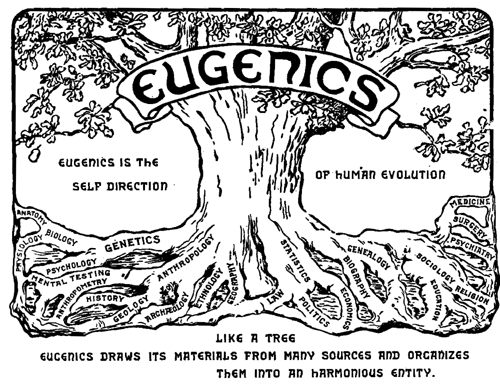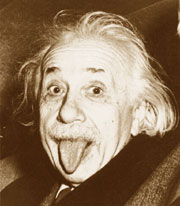
Evolution of Human Intelligence: Where have we been? Where are we going?
Consider this your disclaimer: Available knowledge on the evolution of human intelligence is largely speculative.
Is Intelligent Life Inevitable?
Take the pbs poll
Evolution: Library: Steven Pinker: Evolution of the Mind
Measuring past intelligence is almost impossible. The only record we have from the time preceding written culture are fossils and approximations of environment. This leaves itself open to inference. For example, higher foreheads may indicate an expansion of the frontal lobe which deals with most advanced mental function.
Neural Plasticity = "the brain's ability to undergo physical, chemical, and structural changes as it responds to experiences and to one's environment"
Nature or Nurture?
tracing the debate/ zeitgeist
Due to Darwin's (with a bit of Mendel's) influence, heredity was huge in the second half of the 19th century through the early part of the twentieth.
Galton and the psychological.

reevaluation of intelligence tests in post-WWI convinced a number of scientists that social class may be more influential.
Thought becomes highly environmental from the 40s on--the idea being that anybody could be educated given the right circumstances/ an encouraging environment.
In addition to the premise that measured intelligence
(IQ) is largely genetically inherited, a second important premise was
that IQ is correlated positively with a variety of measures of
socioeconomic success in society, such as a prestigious job, high annual
income, and high educational attainment; and is inversely correlated
with criminality and other measures of social failure. It was suggested
that SES successes (and failures) are largely genetically caused.
Hernstein and Murray were in favor of a custodial state where the intelligent elite would rule their inferiors--largely African-Americans. Diminishing of "genetic capital" because the less intelligent classes are reproducing at greater rates.
Heritability of intelligence is placed between 50-60% according to some widely accepted statistics:
The same person tested twice: 87
Identical twins raised together: 86
Identical twins raised apart: 76
Fraternal twins raised together: 55
Biological siblings: 47
Parents and children living together: 40
Parents and children living apart: 31
Adopted children living together: 0
Unrelated people living apart: 0
Ridley expresses an interactionist point of view:
"Mother Nature has plainly not entrusted the determination of our intellectual capacities to the blind fate of a gene or genes; she gave us parents, learning, language, culture and education to program ourselves with."
Einstein's Brain

When Albert Einstein died in 1955, Dr. Thomas Harvey performed the autopsy. Harvey used the opportunity to hijack the legendary scientist's brain; his act outraged the scientific community (largely because he had not received permission to do so). Harvey eventually requested and received permission from Einstein's son under the condition that he made his findings extensively available. For almost forty years, Harvey. He did not have the training to perform the himself, and he wasn't giving others the opportunity.
Results:
case study (found on the BBC webpage):
NR2B
Research team from Princeton, Washington, and MIT universities "boosted the animals' ability to solve maze tasks, learn from objects and sound in their environment and to retain knowledge"
They determined that this was partially due to the retention of qualities characteristic of young mice. Just like human children, young mice are naturally conditioned for absorbing large amounts of information very quickly.
New Scientist: 11 steps to a better brain
This website was created for H0NOR210: The Ideal, a course offered at Monmouth College during the fall 2005 semester.